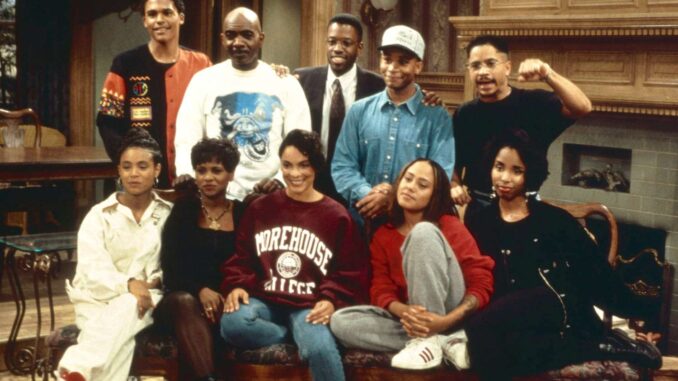
Tuesday, August 4, 1987, writer and producer Yvette Lee Bowser pulled out her diary and started an entry:
It’s 2:52 AM. Today, I begin my first real job as an intern writer with a new NBC sitcom. I’m so excited I can’t sleep. Right now, I’m organizing myself for my big day. I can hardly believe that it’s really happening. I’m going to make something happen with this opportunity, I really am. God knows my heart and how determined I am to make change in this world. Not only in my life, but for others.
Bowser shares this over Zoom from her home office in Los Angeles as one of more than a dozen cast and crew talking about their days on A Different World. The seminal Cosby Show spinoff was developed by Bill Cosby—an indelible fact. But unlike his namesake show, Cosby wasn’t a key player on A Different World, and its orbit of the fictional Hillman College, an HBCU in Virginia, evades any shadow in memory, as enjoyable as ever in Amazon Prime syndication.
On September 24, 1987, A Different World aired its wildly popular pilot, whose ratings surpassed every other program except The Cosby Show. The sitcom originally starred Lisa Bonet, already known to the world as Denise Huxtable. A real-life plot twist occurred when Bonet left after the first season. Debbie Allen came on as director and executive producer, and stayed until its final episode in 1993.

“We changed the world with that show,” Allen says. “We did stories about racism, we did stories about the L.A. riots…we were one of the first shows to address AIDS.” Few sitcoms were tackling such issues at the time, including The Cosby Show, which largely omitted social and political themes from its story lines.
Fans remember the show as much for its cultural relevance as they do for its laugh-out-loud comedy and talented cast. Among them were the nerdy but confident Dwayne Wayne (Kadeem Hardison); silly playboy Ronald “Ron” Johnson (Darryl M. Bell); bougie Southern belle Whitley Gilbert (Jasmine Guy); and free spirit Freddie Brooks (Cree Summer). Other characters, such as jocular dorm director Walter Oakes (Sinbad) and grumpy on-campus restaurant owner Vernon Gaines (Lou Myers), helped round out the picture of college life. Over the years audiences watched them struggle with schoolwork, form meaningful friendships, fall in and out of love, and grow from capricious teens to responsible young adults.
In the 34 years since its debut, A Different World has become one of television’s most impactful shows, inspiring everything from dissertations and lectures to Halloween costumes and social media fan accounts—all while influencing countless young people to attend college, specifically HBCUs. Along with The Cosby Show, it laid the groundwork for shows like The Fresh Prince of Bel-Air, Family Matters, and Living Single—itself created by Bowser—and featured numerous Black actors long before they were famous, including Halle Berry, Jada Pinkett Smith, and Keenen Ivory Wayans. When actor and producer Lena Waithe first joined Instagram in 2011, her handle was @hillmangrad. Today, Hillman Grad is the name of her production company. That A Different World was never nominated for a Golden Globe and never won an Emmy is both unsettling and indicative of how Black shows rarely receive the praise they deserve.
Almost 30 years after that final episode, Bowser, Allen, Hardison, Guy, Bell, Summer, Sinbad, Susan Fales-Hill, Dawnn Lewis, and others recall the stories of A Different World in their own words.

Fales-Hill, who had been a writer for The Cosby Show, was tapped to write for a spinoff, originally titled Stepping Up to Step Out. Shortly after, Bowser joined the team. The original premise was to chronicle the lives of Denise and her two roommates, Maggie and Jaleesa. Meg Ryan was initially cast as Maggie but decided to pursue her film career; Marisa Tomei took her place. Lewis, who was also pursuing a musical career, landed the role of Jaleesa. Loretta Devine played dorm director Stevie Rallen.
Yvette Lee Bowser (writer and producer): I didn’t have aspirations to write for television, but in watching The Cosby Show I felt like there was an opportunity for a voice like mine and a life experience like mine. I tracked down someone that I knew who introduced me to Dr. Cosby and he said, “Go to law school. I have nothing for you out here.” I showed him some stories that I’d written and he chuckled a little bit. Then he gave me an opportunity to be what he called an apprentice writer, which is essentially an intern. It was unpaid.
